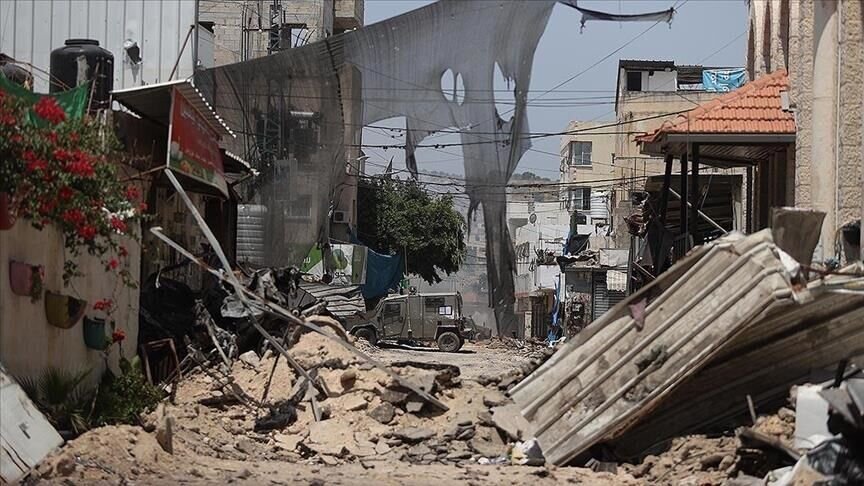Jenin devastation is moral failure for Israeli backers, Iran says

TEHRAN- The “barbaric” invasion on the Jenin camp and the subsequent devastation is a “shameful moral defeat” for Israel’s supporters, the Iranian Foreign Ministry spokesman has said.
Writing on his Twitter account on Sunday, Nasser Kanaani said, “The criminal Zionist regime's war machine suffered another new historic defeat in its recent barbaric attack on Jenin.”
“However, the bigger defeat belongs to the supporters of the Israeli regime. The destructions wreaked on Jenin amount to a shameful moral defeat for the regime’s supporters,” Kanaani added.
The spokesman then counseled the Palestinian government and people to draw attention to the extensive devastation in Jenin, which he described as “a war crime and brazen violation of international law,” as well as to the hypocritical attitude of the so-called human rights defenders.
United Nations experts say Israeli forces’ actions in Jenin amount to “egregious violations of international law”.
Jenin was subjected to one of the most ferocious attacks by the Israeli troops in the past 20 years.
Due to Israel’s two-day attack, at least 12 Palestinians were killed and hundreds were displaced from the Jenin refugee camp.
“Cluster bombs show U.S. push to make Ukraine war worse”
In another tweet on Sunday, Kanaani blasted the U.S. administration’s plan to provide sophisticated cluster bombs to Ukraine, asserting that Washington is willing to prolong and aggravate the conflict in the former Soviet republic.
The deployment of the contentious weaponry as part of a new military aid package to Ukraine has been approved by President Joe Biden, U.S. national security advisor Jake Sullivan confirmed on Friday.
“The US decision to send cluster bombs to Ukraine shows Washington’s determination to perpetuate and further complicate the war in Ukraine,” Kanaani noted.
He stated that the conduct is another illustration of American destabilizing behavior and that such weapons will “indiscriminately contribute to more bloodshed and destruction.”
According to reports that surfaced earlier this week, Ukrainian President Volodymyr Zelensky was pressuring Washington to give his country cluster bombs to deploy against Russian soldiers.
The Biden administration was also urged by the Kyiv government to consent to the transfer of the internationally outlawed weaponry to Ukraine.
Following the incident, the White House said that the United States will provide cluster bombs to aid Ukraine in its counteroffensive against Russia.
Zelensky expressed gratitude for the “much-needed” help, saying that “the expansion of Ukraine's defense capabilities will provide new tools for the de-occupation of our land and the bringing of peace closer.”
Contrarily, Russia vehemently denounced the U.S. intention to give Ukraine modern cluster bombs and said that “the current level of American provocations is really off scale, bringing humanity closer to a new world war.”
The Convention on Cluster Munitions (CCM), an international convention that tackles the humanitarian repercussions and intolerable suffering caused to civilians by cluster munitions, categorically forbids their use and provides a framework for action, forbids cluster bombs.
The weapons can include dozens of tiny bomblets inside of them, which scatter over large regions and frequently kill and injure bystanders.
Because unexploded bomblets can endanger populations for years after warfare has ended, CCMs are prohibited.
Several allies of the U.S. have expressed unease at Washington's decision to supply Ukraine with cluster bombs.
The UK, Canada, New Zealand and Spain all said they were opposed to the use of the weapons.
The decision was also quickly criticized by human rights groups, with Amnesty International saying cluster munitions pose "a grave threat to civilian lives, even long after the conflict has ended".
British Prime Minister Rishi Sunak reiterated that the UK "discourages" the use of cluster bombs, according to BBC.
Britain is one of the countries to have banned the weapons, which have a record of killing civilians, under an existing convention.
The prime minister of New Zealand - one of the countries that pushed for the convention's creation - went further than Sunak, according to comments published by local media.
Chris Hipkins said the weapons were "indiscriminate, they cause huge damage to innocent people, potentially, and they can have a long-lasting effect as well".
Spain's Defense Minister Margarita Robles told reporters her country had a "firm commitment" that certain weapons and bombs could not be sent to Ukraine.
"No to cluster bombs and yes to the legitimate defense of Ukraine, which we understand should not be carried out with cluster bombs," she said.
Leave a Comment